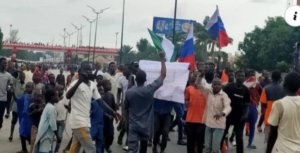How Zanga-Zanga and Tinubu’s Deteriorating Northern Alliance
How Zanga-Zanga and Tinubu’s Deteriorating Northern Alliance

In today’s Saturday Tribune, I examine the erosion of President Bola Tinubu’s support in Northern Nigeria and its implications for his 2027 re-election bid. The 10-day nationwide #EndBadGovernance protests, locally referred to as “Zanga-Zanga” in Northern Nigeria, have exposed the fragility of the coalition Tinubu built with a segment of the Northern Muslim political establishment, which had previously supported both Muhammadu Buhari and Tinubu himself.
The protests have illuminated the precarious nature of this alliance. Buhari and Tinubu, once political rivals who undermined each other, formed a temporary coalition to remove Goodluck Jonathan from power. Tinubu’s allies in the Southwest, who previously defended Buhari despite his governance failures, are now frustrated by the intense anti-Tinubu sentiment in the North. They question why Buhari and his allies did not reciprocate their support.
The answer lies in the nature of their alliance: Tinubu’s support was driven by political calculations rather than genuine loyalty. Buhari’s supporters, having no expectation of reward from Tinubu, feel no obligation to shield him from criticism or defend his policies.
Additionally, Tinubu’s economic policies, which include drastic increases in fuel prices and currency devaluation, have exacerbated the already severe poverty and insecurity in the North. This has led to extreme hardship, with some individuals even expressing a preference for death by police bullets over continued suffering.
The protests are not merely politically motivated but are driven by genuine despair. Many protesters, facing unbearable economic conditions, see the demonstrations as their only avenue for relief, even if it means risking their lives.
The political fallout from Tinubu’s eroded support in the North influences debates in the Southwest about the most effective strategy for maintaining power. The Chief Obafemi Awolowo strategy advocates for an alliance between the South and Northern Christians, viewing the Muslim North as a competitor. Conversely, the Chief Ladoke Akintola approach sees the Muslim North as a strategic partner due to deep historical and cultural ties.
Tinubu, following the Akintola model, aimed to replicate Chief MKO Abiola’s success by fostering a similar alliance. However, with Northern support waning and his economic policies worsening conditions, Tinubu faces a challenging path. To salvage his presidency and improve his chances for a second term, he must reconsider his economic strategies, potentially shifting away from neoliberal policies to focus on welfare-oriented governance that addresses the needs of ordinary Nigerians.
Other strategies, such as appealing to Northern Christians and South-South unity, may not suffice, especially with the potential candidacy of Peter Obi in 2027. Without substantial policy changes, including reducing fuel costs and restoring the naira’s value, Tinubu risks a failed first term and a bleak prospect for re-election.
TRENDING SONGS
 NPMA Appeals to Nigerian Government for Compensation After Lagos Market Fire
NPMA Appeals to Nigerian Government for Compensation After Lagos Market Fire
 Rest Every Four Hours, FRSC Issues Safety Guide for Fasting Motorists
Rest Every Four Hours, FRSC Issues Safety Guide for Fasting Motorists
 NNPC Boss Ojulari Bags UK Energy Institute Fellowship
NNPC Boss Ojulari Bags UK Energy Institute Fellowship
 Shock in Anambra: Bride Disappears Moments Before Wedding
Shock in Anambra: Bride Disappears Moments Before Wedding
 Nigerian Woman Returns ₦330 Million Accidentally Credited to Her Account
Nigerian Woman Returns ₦330 Million Accidentally Credited to Her Account
 APC Don Reach Morocco?’ VeryDarkMan Reacts to Seyi Tinubu Poster
APC Don Reach Morocco?’ VeryDarkMan Reacts to Seyi Tinubu Poster
 Bride Breaks Down in Tears as Wedding Meals Were Kept Secretly While Guests Go Home Hungry
Bride Breaks Down in Tears as Wedding Meals Were Kept Secretly While Guests Go Home Hungry
 Odogwu by Day, Robber by Night: How Marriage Joy Turned Into Tragedy
Odogwu by Day, Robber by Night: How Marriage Joy Turned Into Tragedy
 Nigerian Officials Allegedly Pocket N4–6B Weekly Through Smuggling Cartels at Seme–Badagry Border
Nigerian Officials Allegedly Pocket N4–6B Weekly Through Smuggling Cartels at Seme–Badagry Border
 Ahmad Yerima: Naval Officer to Face No Sanctions After Clash with Wike – Matawalle
Ahmad Yerima: Naval Officer to Face No Sanctions After Clash with Wike – Matawalle
Share this post with your friends on ![]()













